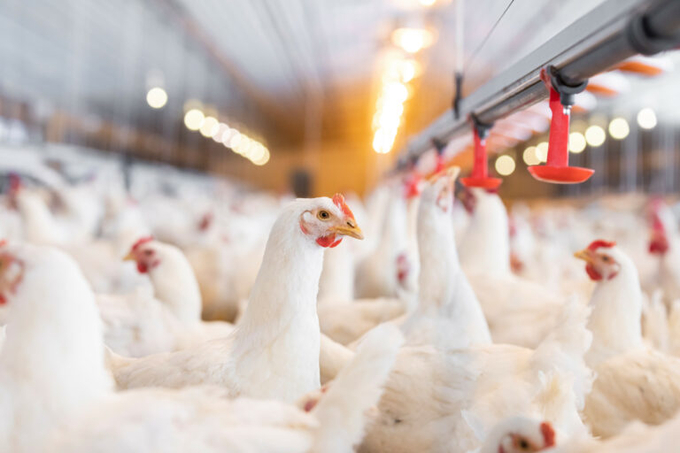May 29, 2025 | 01:37 GMT +7
May 29, 2025 | 01:37 GMT +7
Hotline: 0913.378.918
May 29, 2025 | 01:37 GMT +7
Hotline: 0913.378.918

When birds are consuming less feed, it is imperative that minerals, that are vital for uniformity, skeletal structure and eggshell formation, are readily available. Photo: Alltech.
High air temperatures and relative humidity are two major contributors to stress. These can increase the bird’s core body temperature beyond normal limits, causing a damaging condition known as heat stress.
Optimal production and performance occurs when birds are at thermoneutrality, meaning that body heat production is at its lowest. Above the zone of thermoneutrality, between 18-24°C (65-75°F), the bird’s ability to effectively dissipate heat disappears. At 29°C (85°F), birds start showing signs of distress. Air temperatures approaching or exceeding 37°C (100°F) can be lethal (Noll). Heat stress manifests in several ways, each with its own detrimental effects (see Box).
Increased temperatures, and in some climates increased humidity, are unavoidable in the summer months and, depending on house type and ventilation system, thermoneutrality may be hard to maintain. However, we can control many management and nutrition factors to support poultry through these challenges. As an example, when birds — especially young birds or laying hens in production — are consuming less feed, it is imperative that minerals that are vital for pullet uniformity, skeletal structure and eggshell formation, are readily available.
Crucial minerals
Organic minerals, such as those found in Bioplex and Sel-Plex, are crucial during these stressful times. Organic minerals are metals that are chelated, complexed or covalently bonded to amino acids. There are many types on the market but not all are the same or have the same impact on performance and production. For example, the minerals in Bioplex are metal proteinate chelates which are easily absorbed and readily metabolised, improving animal performance and efficiency — especially when feed intakes are compromised due to heat stress.
Minerals are required for production in all seasons, with each playing an important role in tissue formation and development, skeletal development, immune response and function, as well as eggshell production and quality. If we look at several essential minerals and the role they play in production, we can understand the importance of bio-available sources and how they are utilised:
· Zinc is required for normal immune function, skeletal development and maintenance (Sahin and others, 2009). It is also an important cofactor in carbonic anhydrase activity. A zinc deficiency reduces protein synthesis, as well as impacting the transport of copper and iron in tissues.
· Copper is needed to support the mobilisation of iron from the liver and encourage the absorption of iron and zinc (Brzozowska, 1989).
· Manganese plays a vital role in growth and skeletal development, as well as being an important cofactor to various enzymes involved with eggshell formation (Olgun, 2017).
· Selenium supports numerous metabolic processes and is imperative in reproductive health and immune function (Kumbhar and others, 2018). It also acts as an antioxidant and protects tissue health (Beck, 2007).
Planning
When planning management and nutrition for warmer weather, producers should consider including organic minerals such as those found in Bioplex and Sel-Plex. With their optimal bio-availability, these technologies provide an essential tool to support poultry health, well-being and productivity under heat stress conditions.
· Panting: As they cannot sweat, birds pant to reduce excess body heat. Increased panting from heat stress can increase carbon dioxide (CO2) loss, raising the pH of the blood and creating respiratory alkalosis (Hyline International). This condition reduces the activity of carbonic anhydrase, an enzyme vital in calcium and carbonate ion transfer in the blood to the shell gland or uterus (Hyline International). It also decreases feed intake and calcium availability via the feed, greatly impacting skeletal formation, as well as egg production and quality.
· Overconsumption of water: As poultry drink more water to cool down, they excrete more fluids which can lead to a loss of essential electrolytes, causing dehydration, poor nutrient absorption and disruption of metabolic processes. The kidneys may also be affected. Overconsumption of water can also lead to wet litter which encourages bacterial and fungal growth, endangering the bird’s health and productivity.
· Underconsumption of feed: During periods of heat stress, birds will also consume less feed, resulting in higher feed conversion ratios. This negatively affects egg production, egg weight and eggshell quality. As Dr John Brown of The Poultry Site reported in 2018: “In one study, heat stress was associated with a 31.6% reduction in feed conversion, a 36.4% reduction in egg production and a 3.41% reduction in egg weight, according to a review article from Purdue University and USDA’s Agricultural Research Service”.
(Poultryworld)

(VAN) Vikas Rambal has quietly built a $5 billion business empire in manufacturing, property and solar, and catapulted onto the Rich List.

(VAN) Available cropland now at less than five percent, according to latest geospatial assessment from FAO and UNOSAT.

(VAN) Alt Carbon has raised $12 million in a seed round as it plans to scale its carbon dioxide removal work in the South Asian nation.

(VAN) Attempts to bring down the price of the Japanese staple have had little effect amid a cost-of-living crisis.

(VAN) Fourth most important food crop in peril as Latin America and Caribbean suffer from slow-onset climate disaster.

(VAN) Shifting market dynamics and the noise around new legislation has propelled Trouw Nutrition’s research around early life nutrition in poultry. Today, it continues to be a key area of research.

(VAN) India is concerned about its food security and the livelihoods of its farmers if more US food imports are allowed.